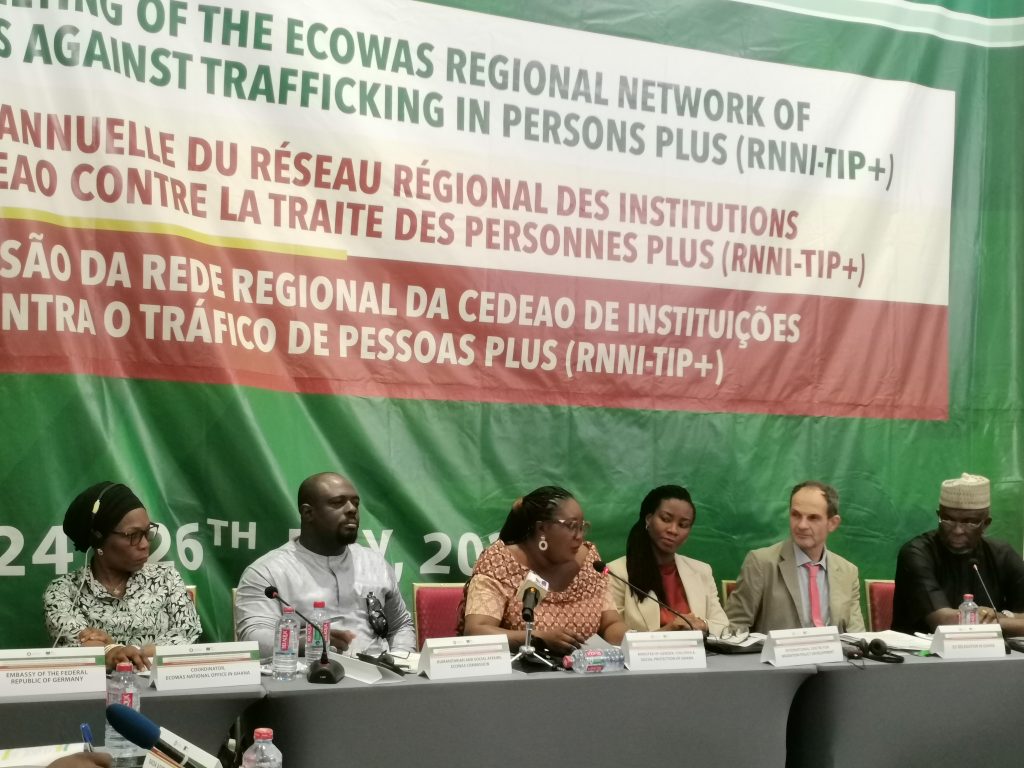By Priscilla Oye Ofori/ Dorphina Ansah
Accra, July 24, GNA — Ms Francisca Oteng Mensah, Deputy Minister for Gender, Children and Social Protection, has advised Ghanaians to contact certified travel and tour agencies for their travelling needs.
She said many travelers were trafficked unknowingly because they used uncertified travel agencies.
Ms Oteng Mensah gave the advice on the sidelines of the 15th Annual Review Meeting of the Economic Community of West African States (ECOWAS) Regional Network of National Focal Institutions against Trafficking in Persons Plus (RNNI-TIP+).
In 2007, the Network of National Traffic In Persons (TIP) Focal Institutions in the Member States, and the Annual Review of Implementation of the ECOWAS Plans of Action to Combat Trafficking was instituted by the ECOWAS TIP Programme.
This ECOWAS’s annual flagship event is based on annual reporting by Member States (MSs) and comprises a peer review mechanism.
The first Annual Synthesis Report (ASR) was compiled by the ECOWAS TIP Programme in 2008, based on a Reporting Template and includes the Reports from each Member State.
The ASRs have, since then, been a tool enabling ECOWAS Member States to ensure compliance of their respective legal, policy and institutional frameworks vis-a-vis the ECOWAS Plan of Action, as well as offering a platform for experience sharing, planning and identification of priorities in the MSs.
The Deputy Minister said contacting certified travel agencies enabled information on trafficked persons to be easily obtained and the required help given to victims.
She said the Gender Ministry had met with stakeholders in the hospitality industry, travel and tour agencies to sensitise them on how to identify trafficking situations and how to report to the right authorities.
Ms Oteng Mensah called for continuous education of the public on human trafficking and urged the citizenry to report suspected cases as well.
The Deputy Minister said the human trafficking canker worm was subtly eating away various fabrics of society and the greed and insensitivity of a few bent on making money at all costs created imbalances for the victims.
She said no justification for human trafficking could erase the emotional, psychological and physical trauma that victims were left with, hence, all forms of exploitation must end.
‘‘It is assuring, however, that the region continuous to make significant strides in its fight against human trafficking. Ghana as a host country for example, is in its second phase of implementing a strategic document; the National Plan of Action for the Elimination of Human Trafficking In Ghana (2022-2026),’’ Ms Oteng Mensah stated.
She acknowledged that shelter to accommodate victims of human trafficking and other related crimes was a challenge in Ghana and across the region.
Mr Olatinde Olayemi, Head of TIP Unit, ECOWAS said whiles there were cases of children involved in domestic servitude trafficking, there had been a higher percentage of adult women for sexual exploitation across borders within West Africa.
He said there were reports of trafficking last year where young men were forced to engage in computer scamming and deprived of their freedom.
Mr Olayemi said there had been a push within West Africa and by ECOWAS at the forefront to reduce the likelihood of the exploitation of children.

He said over the last two years, over five thousand victims had been rescued in West Africa.
Ms Pauline Okkens, Political and Protocol Section, Embassy of the Republic of Germany, said West Africa provided one of the strongest examples of interregional migration flows in sub–Saharan Africa with over 80 per cent migration movement within the sub region.
‘‘Collectively we must strive to optimise the benefits of migration while seeking to combat any adverse effects, particularly human right violations associated with migration, including trafficking in persons,’’ she said.
GNA